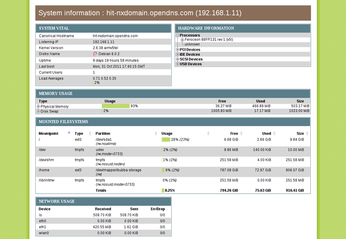Keep an Eye on Your Server with phpSysInfo

Productivity Sauce
Running a server on a local network opens a whole new world of possibilities. You can access your files and documents from multiple machines, stream media, host your own photo gallery or blog, and much more. This also means that you have to monitor your server to make sure it runs smoothly. There are quite a few server monitoring solutions out there, but most of them are overkill for keeping an eye on a single personal server. Enter phpSysInfo, a simple yet powerful script that displays essential system information in an easy-to-digest manner. The best part is that it requires virtually no configuration, and it can be deployed on your server in a matter of minutes. Grab the latest release of the software from the project's website, unpack the downloaded archive, rename the config.php.new file in the resulting directory to config.php and upload the entire phpsysinfo directory to your server. Point then the browser to http://127.0.0.1/phpsysinfo (replace 127.0.0.1 with the actual IP address or host name of your server) and you should see phpSysInfo in all its beauty.
The default phpSysInfo configuration displays all key information, but you can easily add more data points by editing the config.php file. All options available there contain brief but informative descriptions, so enabling and configuring the desired entries is easy. For example, to enable one or several bundled plugins edit the define('PSI_PLUGINS', false); line as in the example below:
define('PSI_PLUGINS', 'PS');phpSysInfo doesn't offer the flexibility or feature set of more advanced server monitoring solutions. But if you only want to be able to keep an eye on your personal server with a minimum of fuss, phpSysInfo is the perfect tool for the job.
Comments
comments powered by DisqusSubscribe to our Linux Newsletters
Find Linux and Open Source Jobs
Subscribe to our ADMIN Newsletters
Support Our Work
Linux Magazine content is made possible with support from readers like you. Please consider contributing when you’ve found an article to be beneficial.

News
-
Plasma Bigscreen Returns
A developer discovered that the Plasma Bigscreen feature had been sitting untouched, so he decided to do something about it.
-
CachyOS Now Lets Users Choose Their Shell
Imagine getting the opportunity to select which shell you want during the installation of your favorite Linux distribution. That's now a thing.
-
Wayland 1.24 Released with Fixes and New Features
Wayland continues to move forward, while X11 slowly vanishes into the shadows, and the latest release includes plenty of improvements.
-
Bugs Found in sudo
Two critical flaws allow users to gain access to root privileges.
-
Fedora Continues 32-Bit Support
In a move that should come as a relief to some portions of the Linux community, Fedora will continue supporting 32-bit architecture.
-
Linux Kernel 6.17 Drops bcachefs
After a clash over some late fixes and disagreements between bcachefs's lead developer and Linus Torvalds, bachefs is out.
-
ONLYOFFICE v9 Embraces AI
Like nearly all office suites on the market (except LibreOffice), ONLYOFFICE has decided to go the AI route.
-
Two Local Privilege Escalation Flaws Discovered in Linux
Qualys researchers have discovered two local privilege escalation vulnerabilities that allow hackers to gain root privileges on major Linux distributions.
-
New TUXEDO InfinityBook Pro Powered by AMD Ryzen AI 300
The TUXEDO InfinityBook Pro 14 Gen10 offers serious power that is ready for your business, development, or entertainment needs.
-
LibreOffice Tested as Possible Office 365 Alternative
Another major organization has decided to test the possibility of migrating from Microsoft's Office 365 to LibreOffice.


PhPSysInfo